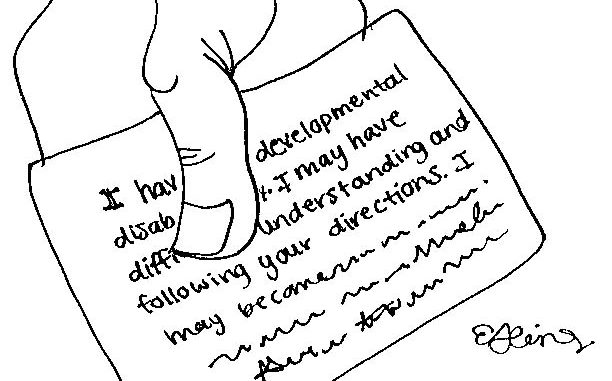
Abuse and exploitation are constant dangers for people with intellectual and developmental disabilities (I/DD). These individuals are four to 10 times more likely to be abused than their peers without disabilities, and are less likely to access the justice system or report the abuse.
This abuse is not limited to caretakers and others known to the individual but is frequently observed in confrontation with law enforcement. In 2017 alone, nearly 1,000 people died in a law enforcement confrontation and disabilities played a role in a quarter of those incidents.
Although intellectual disabilities and developmental disabilities differ in definition and symptoms, individuals with either type of impairment experience difficulty in interpersonal interactions. These difficulties can be interpreted by law enforcement or first responders as lack of cooperation or even hostility.
The scope of the problem, however, extends to virtually every kind of disability. Encounters with police have also taken an unnecessarily violent turn for people with disabilities that are not psychiatric or intellectual, including conditions that are physical or sensory.
In 2008, Ernest Griglen was removed from his car and beaten by police. The officers thought Griglen was driving intoxicated but he is diabetic and was in insulin shock. In 2010, Garry Palmer hit a dog that darted in front of his car and reported the accident as he should have, but because he was slurring his words and shaking, he was arrested for drunk driving. Palmer has cerebral palsy.
In order to help equip law enforcement to properly recognize certain disabilities among their peers and in their communities, the New York State Office for People with Developmental Disabilities (OPWDD) announced on Feb. 28 that identification (ID) cards will now be available for people with I/DD in order to help first responders interact with people with these disabilities.
We at The New Paltz Oracle commend our state’s efforts to combat the mistreatment of those with I/DD, or any medical condition, by law enforcement and caretakers. This initiative is a positive step forward to help first responders better understand and interact with people with developmental disabilities who may not be able to communicate their situation effectively.
According to the bill presented in the state assembly, while there are currently unofficial ID cards available to individuals with I/DD, these cards do not use a consistent standard language.
The front of the state’s new I/DD ID card states “I have a developmental disability. I may have difficulty understanding and following your directions or may become unable to respond. I may become physically agitated if you prompt me verbally or touch me or move too close to me. I am not intentionally refusing to cooperate. I may need your assistance. Please see the back of this card.” The back of the card holds relevant personal information.
We at The Oracle are proud that our state passed legislation for those with I/DD to access documents to communicate their condition for free. However, in order for these documents to be properly implemented it is imperative that additional training for first responders on how to recognize these conditions and properly interact with this population is mandated.
The National Council for Behavioral Health has emerged as a leader of America’s health care organizations that deliver mental health and addictions treatment and services. They offer an eight-hour course across the country called Mental Health First Aid USA that teaches a five-step action plan encompassing the skills, resources and knowledge to help an individual in crisis connect with appropriate professional, peer and self help care.
Participants learn the unique risk factors and warning signs of mental health problems, build understanding of the importance of early intervention, and, most importantly, learn how to help someone in crisis or experiencing a mental health challenge. Mental Health First Aid for Public Safety provides officers with more response options to help them de-escalate incidents and better understand mental illnesses so they can respond to mental health related calls appropriately without compromising safety. Additionally, Mental Health First Aid aims to educate the public on how to defuse these crises, promote mental health literacy, combat the stigma of mental illness and connect people to proper care.
Approximately 20,000 public safety professionals have taken the course, including police academies in Philadelphia, D.C., Seattle and numerous small, rural departments. Among the top five states with individuals who have received this training are California, Pennsylvania, Texas, Michigan and Missouri, all with over 25,000 participants. Noticeably absent from this list is New York.
According to the US Bureau of Justice Statistics’ Census of State and Local Law Enforcement Agencies, as of 2008 there were 514 law enforcement agencies in New York State employing 66,472 sworn police officers and/or local peace officers. Nationally, there are 641,000 adults over age 60 with I/DD. This number is expected to double by 2040.
We believe that, while certainly beneficial, this legislation is not enough for first responders to effectively serve the population of those with I/DD. Furthermore, we believe that New York State needs to mandate training to address discrimination of other communities as well including, but not limited to, the deaf community, minorities and the LGBQTIA+ community.
This documentation will fail if it is not backed by state mandated training for first responders to recognize and interact with those with I/DD. It is imperative that our law enforcement prioritize de-escalation over action in an emergency situation. An emphasis on de-escalation will benefit both parties in maximizing safety and appropriate conduct for both law enforcement and civilians.
